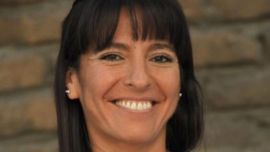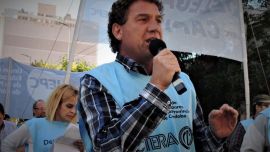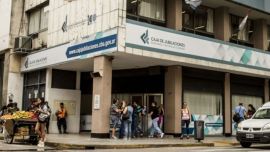MENDOZA MINING ROW: GOVERNOR BACKTRACKS AMID HUGE PROTESTS
The provincial government in Mendoza has put the brakes on controversial modifications to Law 7722, after Governor Rodolfo Suárez called for “a dialogue” over alterations critics say would weaken protections on mining practices in the region. Suárez, speaking at a press conference on Boxing Day at Government House, said he would suspend the changes for now. Protests erupted last week after Mendoza’s lawmakers approved a new version of Law 7722, which had previously restricted the use of dangerous chemicals in mining operations and blocked water-intensive projects in the region amid concerns over their environmental impact. There have been clashes between police and demonstrators in recent days. Activists, who seek the repeal of the new measures, said they would continue their demonstrations unabated. (For plenty more on this story – including an exclusive interview with a co-author of the original version of Law 7722, visit our website.)
FERNÁNDEZ’S EMERGENCY MEASURES KICK IN
The government published the text of its “Emergency Law of Social Solidarity and Productive Reactivation,” in the Official Gazette (Boletín Oficial) on Christmas Eve, passsing the measure into law. The new legislation, among other steps, immediately introduces a 30 percent surcharge on dollar and foreign currency purchases. It also suspends existing updates to pension payments for 180 days as contribution levels are studied and increases duties on agricultural exports, in some cases reaching as high as 33 percent. The government estimate it will bring in around US$7 billion annually. Law 27.541 was sanctioned in just 48 hours by Congress. The bill passed the lower house of Congress on Friday and the Senate on Saturday. The Buenos Aires Stock Exchange rose by almost six percent on Thursday in response. Some 118 companies saw their share price rise, with just 17 dropping as more than 1.5 billion pesos (US$25 million) were traded.
ECONOMIC SHRINKAGE
Ar g e n t i n a’s e c o n o m y shrank by an estimated 0.9 percent in October yearon-year, according to data from the INDEC national statistics bureau. The agency’s Monthly Economic Activity Estimator (EMAE) showed a contraction of almost one percent in the tenth month of the year, confirming 2.3-percent shrinkage overall for Argentina’s economy in 2019 up until the end of October. INDEC’s EMAE index has now registered 17 consecutive months of decline, Noticias Argentinas reported.
EVO SPARKS IRE BACK HOME
Former Bolivia president Evo Morales, currently living in Argentina as a refugee, continues to anger the interim government that has replaced him in his homeland. Already the subject of an arrest warrant for alleged “sedition” and terrorism-related charges, Morales has made headlines all week from his current base in Buenos Aires. Earlier in the week, he alleged that he was forced from office by a United Statesbacked coup d’état aimed at gaining access to the country’s vast lithium resources in an interview. On Thursday, he drew a large crowd in the capital as he joined the Mothers of Plaza de Mayo for their weekly march in the capital’s famous square, sparking Hebe de Bonafini to angrily criticise those who were seeking photos with the ex-Bolivia leader. On Friday, Jeanine Añez’s interim government slammed Morales for “usurping functions” after he inaugurated a public works project in Tarija, Bolivia, with a speech delivered over the telephone, while reports also emerged that diplomats from the US Embassy had sought an urgent meeting with the Alberto Fernández’s government over a scheduled meeting of leaders from Morales’ political party, Movement for Socialism (MAS), this Sunday at an as-yet undisclosed location on the border between Argentina and Bolivia.
WHEN DIEGO MET ALBERTO
President Alberto Fernández welcomed Diego Armando Maradona to the Casa Rosada on Thursday, with Argentina’s most famous footballing son later taking to the building’s famous balcony. Maradona, currently the coach of Gimnasia y Esgrima La Plata, presented the ‘Proyecto Potreros’ plan to the president, which its organisers hope will provide more footballing opportunities in deprived neighbourhoods. Maradona met with Fernández in the president’s office, with a series of photographs shared on social media – one showed the duo seated in discussion, with several football shirts and a ball around them (according to reports, Fernández asked his idol to sign an Argentinos Juniors shirt – the president is a fan of the club at which Maradona started his career in the 1970s.) After the meeting, Maradona took to the balcony, where he famously appeared with his Albiceleste team-mates back in 1986, presenting the World Cup to ecstatic fans. This time around, however, there awaited below a handful of Argentines, Casa Rosada staff and tourists passing by. Nevertheless, El Díez didn’t miss his chance to spark a little controversy, yelling “They are not coming back!” – a reference to Mauricio Macri’s government. He then yelled that the former president should “go live in Thailand.”
THIS WEEK IN CORRUPTION...
Argentina’s highest criminal court on Friday revoked former president Carlos Menem’s prison sentence for for the controversial sale of the La Rural exhibition centre in 1991. Ex-economy minister Domingo Cavallo was also cleared. Both had received sentences of over three years after being convicted in March earlier this year. After evaluating precedents and international treaties, Judges Eduardo Riggi, Juan Carlos Gemignani and Judge Liliana Catucci ruled that “the right to be tried without undue delay” could not have been “satisfied” as “a reasonable time” had passed since the controversial US$30-million sale in 1991 and their trial. The sale of the Rural Society’s fairground building, which prosecutors believe should have been valued close to US$130 million, took place by decree, despite the property’s status as a public building whose sale required the approval of Congress.
SECURITY SPAT
Ex-security minister Patricia Bullrich has strongly criticised the government, accusing her political opponents of having an “ideological apparatus that is always on the side of the thief.” The comments come after Sabrina Frederic – Bullrich’s successor as Argentina’s security minister – moved to eliminate protocols the departed official introduced for the use of firearms and tasers, as well as other policies. Frederic also drew attention by saying she would re-look at several highprofile cases, including the deaths of late AMIA special prosecutor Alberto Nisman and dead artisan Santiago Maldonado. “They are always against the police,” charged Bullrich.
SUPREME COURT FREES WOMEN
The Supreme Court on Friday cleared two women, who have spent more than a decade behind bars, of convictions. The justices absolved the duo, who were facing life terms behind bars for the killing of an elderly woman in the northeast city of Posadas, Misiones Province. In a unanimous ruling, Argentina’s top court found that the 2010 convictions of Cristina Vázquez and Lucia Cecilia Rojas, both ahed 37, were based on a “partial and inconsistent analysis of the case.” Up until the ruling, Vázquez had been held at the Misiones women’s prison and Rojas at the female detention centre in Ezeiza. The two have spent 11 and 14 years in prison respectively. Both women always denied their involvement in the murder of 79-year-old Ersenilda Leíla Dávalos, who was bludgeoned to death by a hammer on 28 July 2001 at her home in Posadas.
FARE FREEZE
Transport Minister Mario Meoni said Friday that the government would freeze public transport fares in and around the capital for six months, as it undertakes a comprehensive review of the system in the metropolitan area of Buenos Aires. The decision means the government will allocate 60 billion pesos to cover subsidies for the 180 days the review will last. During 2019, the government spent 120 billion pesos on the same subsidies, according to Noticias Argentinas. The move will affect approximately 10 million people who use public transport every day in Greater Buenos Aires. Transport fares were last updated in March. Mauricio Macri later halted price rises and increased subsidies during the election campaign.


























Comments